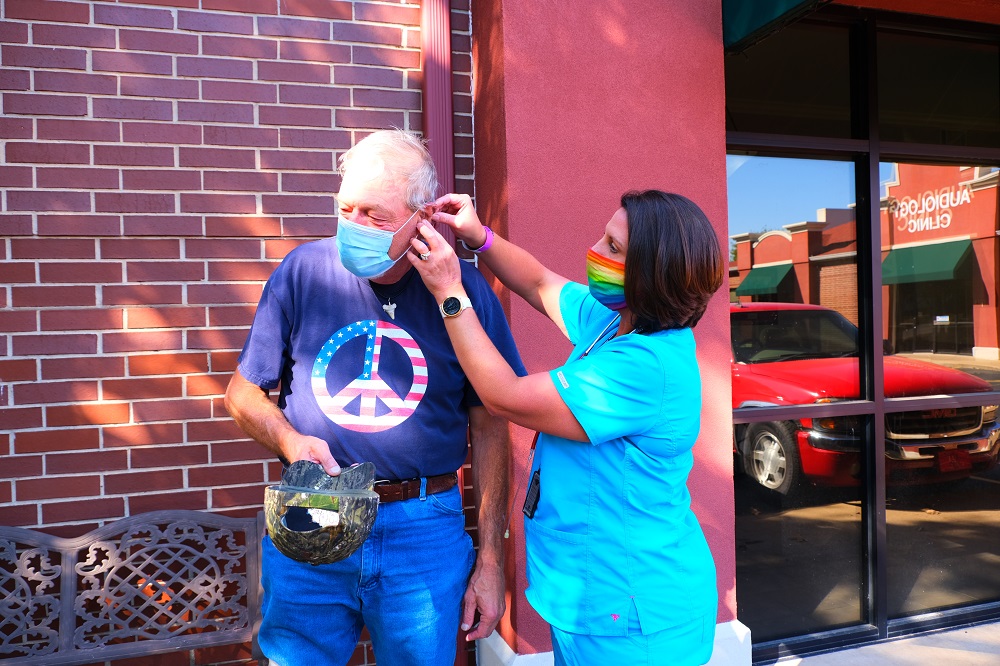It’s a fact of life that things break, malfunction or just plain stop working. Hearing aids are no exception. But how do you troubleshoot a malfunctioning hearing aid during a pandemic?
At the Veterans Health Care System of the Ozarks (VHSO), audiology staff had to be creative and think of new ways to facilitate patient distancing to safeguard both patients and employees, while continuing to provide high quality service and care. This involved re-structuring appointment times and exit strategies to reduce the number of people in any one space. It also included finding adequate time to thoroughly disinfect test rooms between patients.
VHSO staff found it best if audiologists and audiology assistants went to the Veterans who had non-functioning hearing aids, instead of the other way around. The staff developed a curbside service program to meet Veterans in their vehicles to assist with hearing aid issues.
Audiologist meets Veterans in the parking lot
When a Veteran contacts VHSO with hearing aid problems, Audiology staff instruct them to remain in their vehicle upon arrival at the clinic and then text or call with their location and vehicle information. With appropriate PPE, an audiologist or an audiology assistant meets the masked Veteran in the parking lot to triage the hearing aid problem.
While the Veteran remains safe in their vehicle, the hearing aid is brought into the hearing aid lab for cleaning and repair. Once the cleaning and repairs are complete, staff return the hearing aid to the Veteran waiting in their vehicle.
In some cases, the fitting of a hearing aid requires the Veteran to step outside their car.
Pictured above, health technician Stefanie Wilson recently assisted Veteran Mark Bonner with his hearing aids. Bonner couldn’t stop thanking her for so quickly fixing the problem.
Audiology staff at VHSO are able to provide prompt hearing aid services despite COVID-19. This is extremely important because Veterans with hearing loss are especially vulnerable to isolation. Curbside hearing aid services have ensured that patients’ hearing aids are serviced promptly to alleviate the feeling of social isolation.
The curbside service has proven to be a win for everyone. And Veterans are happy and appreciative of the thoughtfulness and caring.
“No longer will we holler.”
One Veteran’s family member sent the following note of thanks: “There was this audiologist who we met in the parking lot because of COVID-19. His attitude was great and we had a wonderful time. Now my husband can hear me talking and I don’t have to scream. No longer will we holler. Our words will flow like a stream.”
Like all health care facilities at this time, VHSO has adapted and modified processes to continue to serve patients. The health care system, based in Fayetteville, Arkansas, proudly serves Veterans residing in northwest Arkansas, southwest Missouri, southeast Kansas, and northeast Oklahoma.
Crystal L. Davis is the public affairs officer for the Veterans Health Care System of the Ozarks.
Topics in this story
More Stories
Watch the Under Secretary for Health and a panel of experts discuss VA Health Connect tele-emergency care.
The 2024 National Veteran Suicide Prevention Annual Report provides the foundation for VA’s suicide prevention programs and initiatives.
Theranostics is a specialized field of nuclear medicine that uses a two-pronged approach to diagnose and treat cancer.







MaGuire don’t have to clean up after us. They don’t answer the phone sooo we can’t get in!
P.S. The VA is possibly the culprit causing all the suicides due to their failure to treat patients…